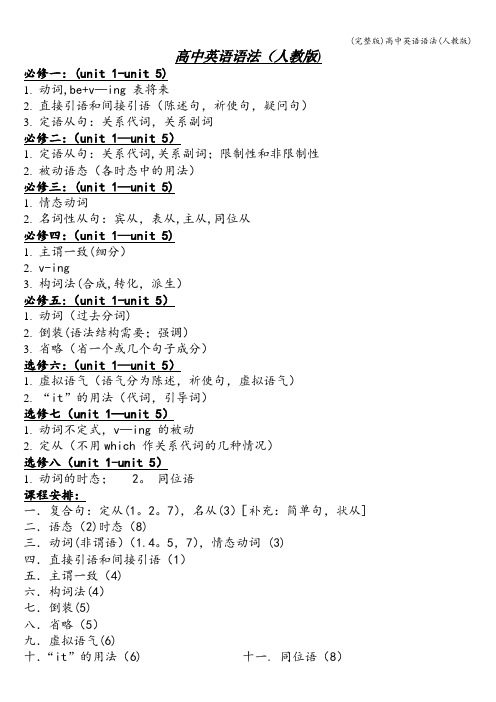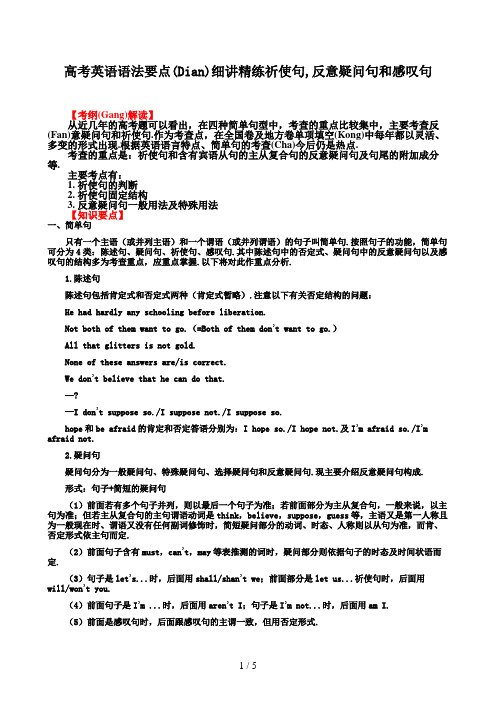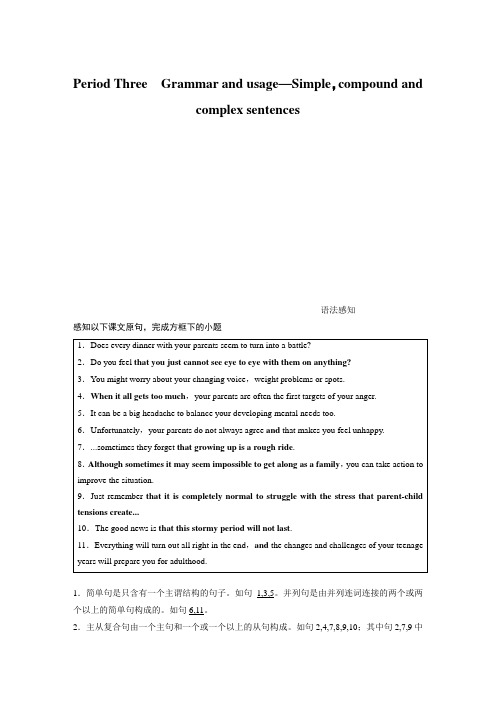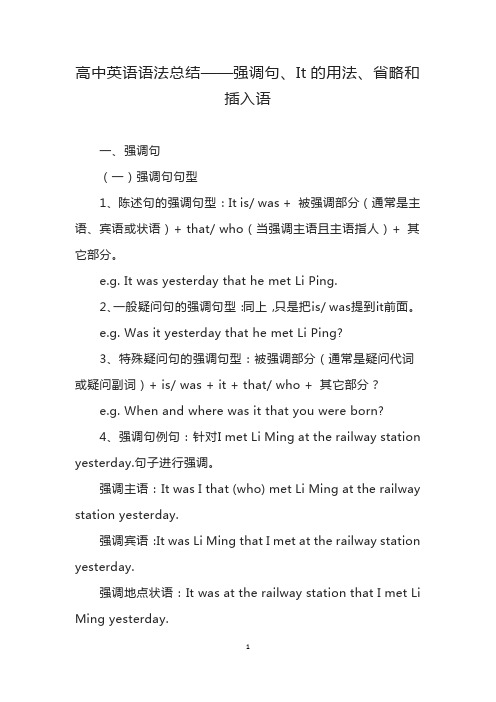高中英语语法主从复合句(2)
(完整版)高中英语语法(人教版)

(完整版)高中英语语法(人教版)
高中英语语法(人教版)
必修一:(unit 1-unit 5)
1.动词,be+v—ing 表将来
2.直接引语和间接引语(陈述句,祈使句,疑问句)
3.定语从句:关系代词,关系副词
必修二:(unit 1—unit 5)
1.定语从句:关系代词,关系副词;限制性和非限制性
2.被动语态(各时态中的用法)
必修三:(unit 1—unit 5)
1.情态动词
2.名词性从句:宾从,表从,主从,同位从
必修四:(unit 1—unit 5)
1.主谓一致(细分)
2.v-ing
3.构词法(合成,转化,派生)
必修五:(unit 1-unit 5)
1.动词(过去分词)
2.倒装(语法结构需要;强调)
3.省略(省一个或几个句子成分)
选修六:(unit 1—unit 5)
1.虚拟语气(语气分为陈述,祈使句,虚拟语气)
2.“it”的用法(代词,引导词)
选修七(unit 1—unit 5)
1.动词不定式,v—ing 的被动
2.定从(不用which 作关系代词的几种情况)
选修八(unit 1-unit 5)
1.动词的时态; 2。
同位语
课程安排:
一.复合句:定从(1。
2。
7),名从(3)[补充:简单句,状从]
二.语态(2)时态(8)
三.动词(非谓语)(1.4。
5,7),情态动词 (3)
四.直接引语和间接引语(1)
五.主谓一致(4)
六.构词法(4)
七.倒装(5)
八.省略(5)
九.虚拟语气(6)
十.“it”的用法(6) 十一. 同位语(8)。
高考英语语法要点细讲精练祈使句,反意疑问句和感叹句

高考英语语法要点(Dian)细讲精练祈使句,反意疑问句和感叹句【考纲(Gang)解读】从近几年的高考题可以看出,在四种简单句型中,考查的重点比较集中,主要考查反(Fan)意疑问句和祈使句.作为考查点,在全国卷及地方卷单项填空(Kong)中每年都以灵活、多变的形式出现.根据英语语言特点、简单句的考查(Cha)今后仍是热点.考查的重点是:祈使句和含有宾语从句的主从复合句的反意疑问句及句尾的附加成分等.主要考点有:1. 祈使句的判断2. 祈使句固定结构3. 反意疑问句一般用法及特殊用法【知识要点】一、简单句只有一个主语(或并列主语)和一个谓语(或并列谓语)的句子叫简单句.按照句子的功能,简单句可分为4类:陈述句、疑问句、祈使句、感叹句.其中陈述句中的否定式、疑问句中的反意疑问句以及感叹句的结构多为考查重点,应重点掌握.以下将对此作重点分析.1.陈述句陈述句包括肯定式和否定式两种(肯定式暂略).注意以下有关否定结构的问题:He had hardly any schooling before liberation.Not both of them want to go.(=Both of them don’t want to go.)All that glitters is not gold.None of these answers are/is correct.We don’t believe that he can do that.—?—I don’t suppose so./I suppose not./I suppose so.hope和be afraid的肯定和否定答语分别为:I hope so./I hope not.及I’m afraid so./I’m afraid not.2.疑问句疑问句分为一般疑问句、特殊疑问句、选择疑问句和反意疑问句.现主要介绍反意疑问句构成.形式:句子+简短的疑问句(1)前面若有多个句子并列,则以最后一个句子为准;若前面部分为主从复合句,一般来说,以主句为准;但若主从复合句的主句谓语动词是think,believe,suppose,guess等,主语又是第一人称且为一般现在时、谓语又没有任何副词修饰时,简短疑问部分的动词、时态、人称则以从句为准,而肯、否定形式依主句而定.(2)前面句子含有must,can’t,may等表推测的词时,疑问部分则依据句子的时态及时间状语而定.(3)句子是let’s...时,后面用shall/shan’t we;前面部分是let us...祈使句时,后面用will/won’t you.(4)前面句子是I’m ...时,后面用aren’t I;句子是I’m not...时,后面用am I.(5)前面是感叹句时,后面跟感叹句的主谓一致,但用否定形式.(6)当主语是(Shi)anyone/anybody/everyone/everybody时,疑问部分用复数形式.否定、肯(Ken)定形式:(1)一般说来,前后两部分的否定、肯定形式相反;但当句子前有Oh,Ah,So等语(Yu)气词时,前面两部分的否定、肯定形式相同.(2)前面部分有否定词或半否定词时,后面部分用肯定形式(Shi);但若前面部分含有由否定词缀构成的否定词时,后面部分还是用否定形式.There used to be a cinema here before the war,use(d)n’t there/didn’t there?Such things ought not to be allowed,ought they?e,does he?You don’t think he can finish the work by himself,do you?Have a cup of tea,will you?3.祈使(Shi)句表示请求、命令、叮嘱等.祈使句的主语是you,但一般被省略;当前面有呼语时,一般得补出主语you;否定式一般是前面加Don’t.在“祈使句+and/or/and then+句子”句型中,当祈使句中含有比较级时,可将祈使句中的谓语部分省略,只留下“比较级或比较级与名词+and/or/and then+句子”.Get up early tomorrow,or you’ll miss the first bus.4.感叹句how修饰形容词、副词或动词构成感叹句.如:How fluently she speaks English!what修饰名词或名词短语构成感叹句.如:What fun!What a lovely girl she is!【考点诠释】考点l 祈使句的判定和特点祈使句用来表达说话人的请求、命令、建议、劝告等.谓语动词用动词原形.其主语是you,往往省略.常见的祈使句句型如下:1.动词原形…如:①Lay down your arms!放下武器!②Be sure to get there before eight O’clock.一定要在8点前赶到那儿.2.Don’t或Never+动词原形....如:Never go out alone at night!不要在夜晚单独出去!3.Do+动词原形…(此句型表示强调).如:Do tell her about it.务必将此事告诉她.4.主语+动词原形….如:Tom.you go and see what’S happening.汤姆,去看看发生什么事情了.You,girls,clean the desk;you,boys,sweep the floor.你们,女生擦桌子.你们,男生,打扫地板.5.祈使句+and/or+陈述句 (and表示顺承关系,or表示转折关系).如:①use your head,and you’11 find a good way.(=If you use your head,you’11 find a good way.)动动脑筋,你会找到一种好办法的.②Hurry up,or we’11 be late.(=If we don’t hurry up,we’11 be late.)快点,不然我们就迟到了.6.Be SO kind/good as+不定式…(此句型用来表达客气的请求,so kind/good as相(Xiang)当于kind/good enough).如:Be kind enough to lend me your dictionary.请把(Ba)你的字典借给我吧.考点2 反意疑(Yi)问句1.基(Ji)本结构如陈述部分为肯定形式,简短(Duan)问句为否定形式;如陈述部分为否定形式,简短问句为肯定形式.如:①It is a fine day,isn’t it?今天是个好天气,不是吗?②He isn’t a teacher,is he?他不是老师,对吗?特别提示前半部分为否定形式的反意疑问句的答语与汉语不同.如:一Tom doesn’t know it.does he?汤姆不知道这事,对吧? 一No.he doesn’t./Yes,he does.对,他不知道./不,他知道.2.陈述部分如含有”never/hardly/scarcely/seldom/little/few/nobody/nothing…”等否定词或半否定词时,这部分应视为否定形式,简短问句就用肯定形式.如:He was hardly twelve then,was he?他当时几乎不到十二岁,是吗?3.陈述部分含有带”否定”前缀的词,则这部分应看做肯定形式,简短问句就用否定形式.如:she dislikes the way you work,doesn’t she?她不喜欢你的工作方式,对吗?4.祈使句的反意疑问句肯定的祈使句,简短问句用will you/won’t you;否定的祈使句,简短问句用will you.如:Have a little more coffee.will you/won’t you?再来点咖啡,好吗?5.陈述部分含有must表推测时的反意疑问句陈述部分中的must表”一定,想必”等推测意义时,要根据陈述句部分的真实结构,在简短问句中采用与其相符合的助动词形式.(1)对现在的推测:You must be hungry now,aren’t you?你此刻一定很饿,对吧?=I’m sure you’re hungry now,aren’t you?(2)对现在进行时的推测:He must be watching TV now,isn’t he?他现在一定在看电视,对吗?:I’m sure he is watching TV now,isn’t he?(3)对现在完成时的推测:Tom must have lived here for a long time.hasn’t he?Tom一定在这儿生活了很久,对吗=I’m sure Tom has lived here for a long time,hasn’t he?(4)对过去的推测:She must have arrived yesterday,didn’t she?她昨天一定来了,对吗=I’m sure she arrived yesterday,didn’t she?(陈述部分有表示过去的时间状语yesterday) 6.陈述部分的主语为this/that/everything等时,简短问句的主语用it.如:Everything is all right,isn’t it?一切准备就绪,是吗?7.陈述部分的主语为everyone/everybody/anyone/anybody/nobody/no one/someone等时,简短问句的主语用he,口语中也用they.如:Everyone knows the answer,doesn’t he/don’t they?每个人都知道这个答案,对吗?8.如陈述部分的谓语动词是wish,则简短问句用可提前的情态动词may.如:1 wish to call on you tonight,may I?我今晚想去拜访你,可以吗?9.陈述部分是there be句型时,简短问句的主语用there.如:There used to be a village near the mountain,usedn’t there?山的旁边曾经有一个山村,是吗10.在复合句的反意疑问句中,简短问句的主谓语须与主句的主谓语保持一致.如:e,isn’t it?你是第一次来这儿,对吗7特别提示如果陈述部分是I/We don’t think/believe/suppose/imagine+宾语从句,则简短问句的主语要与宾语从句的主语保持一致.如:I don’t think he is forty,is he?我认为他没有四十岁,是吗?考点3感叹句感叹句常表示说话时的惊讶、喜悦、气愤等情绪.感叹句常有以下几种情形:1.what式感叹句(1)What+a/an+形容词+单数可数名词+主语+谓语!如:What a wonderful time we had yesterday!昨天我们玩得多开(Kai)心呀!(2)What+形(Xing)容词+复数名词+主语+谓语!如:What beautiful flowers they are!多美的花儿(Er)啊!(3)What+形容词+不可数名(Ming)词+主语+谓语!如:What fine weather it is!多好的(De)天气啊!2.how式感叹句(1)How+形容词/副词+主语+谓语!如:How clever she is!她多么聪明呀!(2)How+形容词+a/an+单数可数名词+主语+谓语!如:How strange a feeling it was!多么奇怪的一种感情啊!3.省略式感叹句(1)how直接修饰谓语动词:How+主语+谓语!如:How we love our motherland!我们是多么热爱自己的祖国啊!(2)省略主语和谓语.如:What an interesting book!多有趣的一本书啊!4.特殊式感叹句①The design and the colours!多美的图案和色彩!②To sell such a suit as that to a millionaire!竟然把那样一套衣服卖给了一个百万富翁!【试题放送】1. 【2018池州市普通高中高三第一学期教学质监】—Do you still believe in love?—Absolutely. It is not time, money, power or whatever but love cures our pain.A.who B.which C.that D.what【答案】C【解析】考查强调句.这是一个“it is …that…”强调结构.强调部分为“not time, money, power or whatever but love”,里面使用了“not …but”结构.2. 【2018安徽宿州高三一次质检】—I am shocked at the news that many pupils were killedin the terrible traffic accident.—So am I. Little the safety of the poor children.A.did the local government care forB.the local government cared forC.did the local government care aboutD.the local government cared about【答案】C【解析】考查倒装和短语辨析.否定词little为否定副词,所以用部分倒装结构,故排除B和D.care for喜欢,care about在乎.答语句意为:我也很震惊,当地政府很少在意贫困儿童的安全.3. 【2018云南省部分名校一次统考】______ at the news that her eyes rained tears.A. So was Rebecca sadB. So sad was RebeccaC. So sad Rebecca wasD. Was Rebecca so sad【答案】B【解析】考查倒装.“so…that”结构中,so 和形容词提前,后面要用部分倒装结构.4. 【2018浙江温州高三期期末八校联考】Not only ______ a promise ,but she also kept it.A. did she makeB.she madeC. does she makeD. had she made【答案】A【解析】考查倒装句式. Not only提前,用部分倒装结构.句意为:他不仅许下了诺言,而且还坚守了诺言.5. 【2018·莱芜期末】Nowhere else, as his mother told us, _____ except the cabin in the backyard.A. did he goB. he did goC. went heD. he went【答案】A【解析】考查倒装.nowhere【意思是:没有一个地方】表示否定意义的副词位于句首要用部分倒装结构.6. 【2018池州市普通高中高三第一学期教学质监】—Do you still believe in love?—Absolutely. It is not time, money, power or whatever but love cures our pain.A.who B.which C.that D.what【答(Da)案】C【解析(Xi)】考查强调句.这是(Shi)一个“it is …that…”强调(Diao)结构.强调(Diao)部分为“not time, money, power or whatever but love”,里面使用了“not …but”结构.7. 【2018·金华十校期末】Are you free tonight? ______, I'd like you to meet Tom, my newfriend from the States.A.Even so B.When necessaryC.If not D.If so【答案】D【解析】考查替代.If so.意思是:如果这样的话.这里so替代的是上文的:you are free.8. 【2018·上海春招】 It was not until 1920 _______American women had the chance to vote in national elections.A. whenB. thatC. whereD. which【答案】B【解析】考查强调句型.此处not until 1920是被强调的部分.句意:直到1920年美国妇女才能在国家选举中有机会投票.9. 【2018江西丰、樟、高、宜四市联考】——He ought to have been warned of thedanger.——____, but he wouldn’t listen to me.A.yes, he ought to B.So he didC.So it was with him.D.So he was【答案】D【及解析】考查特殊句式. so+主语+助动词/系动词/情态动词表示“确实如此”.根据答语后半句可知空处表示他确实被警告了,因此选D项.10.【2018安徽宿州高三一次质检】—I am shocked at the news that many pupils were killed in the terrible traffic accident.—So am I. Little the safety of the poor children.A.did the local government care forB.the local government cared forC.did the local government care aboutD.the local government cared about【答案】C【解析】考查倒装和短语辨析.否定词little为否定副词,所以用部分倒装结构,故排除B和D.care for喜欢,care about在乎.答语句意为:我也很震惊,当地政府很少在意贫困儿童的安全.。
高中英语句子成分分析

1. The sun│rose. 2. Who │cares? 3. What he said │does not matter. 4. They │talked for half an hour. 5. Who │knows │the answer? 6. He │has refused │to help them. 7. He │enjoys │reading. 8. He │said │"Good morning."
(五) 挑出下列句中的状语
① There was a big smile on her face.
② Every night he heard the noise upstairs.
③ He began to learn English when he was
eleven. ④ The man on the motorbike was traveling too fast.
• 宾语分为直接宾语和间接宾语.直接宾语指 物,间接宾语指人. • He gave me some books. ↓ 间接 宾语 ↓ 直接 宾语
(四)宾语补足语
• • • • • • • I found the book interesting. Do you hear Tom singing? He made himself known to them. She asked me to lend her a hand. Please make yourself at home. Please keep the dog out. We must keep it a secret.
1.You will tell (your) friend that you’ve got to school.
高中英语语法——主语从句课件(57张)

引导词
4) 连接副词when, where, how ,why • When we will leave hasn’t been decided. • How she keeps healthy is a secret.
Whether he will come makes no difference. What we need is more time.
引导词
1) 从属连词that和whether: • That he will come is certain. • Whether he will come is uncertain.
• What we need is more time.
• Which book I shall choose hasn’t been decided.
引导词
3)连接代词whoever, whatever, whichever • Whoever comes is welcome. • Whatever I have is yours. • Whichever you want is yours.
_____ that 只起引导作用,本身无意义,不充当 任何分,但不能省略。 whether 不做成分,表“_______ 是否 ”。 在主语从句中只能用 _________, ___ whether 不能用if
引导词
2) 连接代词who, what, which • Who will go makes no difference.
1. 令人吃惊的是他改变了主意。 It is a surprise that he changed his mind. 2. 真可惜你错过了这么一个好机会。 It is a pity that you missed such a good chance. 3. 事实是我们周围的污染正变得越来越严重。 It is a fact that the pollution around us is becoming more and more serious.
译林版高中英语必修一Unit2 Period Three Grammar and usage—Simple,compound and complex sentences

Period Three Grammar and usage—Simple,compound andcomplex sentences语法感知感知以下课文原句,完成方框下的小题1.简单句是只含有一个主谓结构的句子。
如句1,3,5。
并列句是由并列连词连接的两个或两个以上的简单句构成的。
如句6,11。
2.主从复合句由一个主句和一个或一个以上的从句构成。
如句2,4,7,8,9,10;其中句2,7,9中that引导宾语从句;句4中when引导时间状语从句;句8中although引导让步状语从句;句10中that引导表语从句。
语法精析1.简单句只含有一个主谓结构的句子叫简单句。
有八种基本类型:(1)主谓:主语+谓语(2)主系表:主语+连系动词+表语(3)主谓宾:主语+谓语+宾语(4)主谓宾宾:主语+谓语+间接宾语+直接宾语(5)主谓宾补:主语+谓语+宾语+宾语补足语(6)主谓状:主语+谓语+状语(7)主谓宾状:主语+谓语+宾语+状语(8)存现句:表示事物存在、出现、消失的句式。
2.并列句由两个或两个以上不分主次、相互独立的简单句构成的句子叫并列句。
并列句通过并列连词、连接副词和分号三种方式连接起来。
常见的并列连词:(1)and表示平行、顺接、递进等He was cleaning the room and his children were playing outside.他在打扫房间,他的孩子们在外面玩耍。
(2)but表示转折(但是,然而)His son came back,but he was still concerned.他儿子回来了,但是他仍然很担心。
(3)for表示原因或理由It must have rained yesterday evening,for the ground is wet.昨晚准是下雨了,因为地面是湿的。
(4)so表示结果(所以)The manager was ill so I went to the press conference in his place.经理病了所以我代他去参加发布会。
2025年云南省中考英语人教版一轮复习++专题十+主从复合句+课件

(一……就……)
条件状语 if(如果), unless(除非;如果不), as/so long as 从句 (只要)
续表
从句类型
引导词
原因状语 从句
because(因为),
since(既然),
as(因为;由于)
目的状语 从句
so
that(以便;为了),
in
order
that(为了;以便)
结果状语 so/such...that...(如此……以至于……), so that(因此;所 从句 以)
(2)宾语从句可以转换为“动词+动词不定式”或“特殊疑问词+动词不定式” 结构
I hope that I can go to senior high school.=I hope to go to senior high school.我希望我能上高中。 I didn't know how I could do it.=I didn't know how to do it.我不知道 怎么做这件事。
项目二 语法过关
专题十 主从复合句
语法梳理 考点综合过关
考点1 宾语从句(必考)
考点复习 在句中起宾语作用的从句称为宾语从句。包括动词的宾语从句、介词
的宾语从句和系表结构的宾语从句。宾语从句的连接词有从属连词that, whether, if;连接代词what, who, whom, whose, which等;连接 副词when, where, how, why等。
地点状语 从句 where(在哪里), wherever(无论什么地方)
方式状语 从句 as(按……的方式;像……), as if/though(好像)
续表
高中英语语法总结--强调句、It的用法、省略和插入语

高中英语语法总结——强调句、It的用法、省略和插入语一、强调句(一)强调句句型1、陈述句的强调句型:It is/ was + 被强调部分(通常是主语、宾语或状语)+ that/ who(当强调主语且主语指人)+ 其它部分。
e.g. It was yesterday that he met Li Ping.2、一般疑问句的强调句型:同上,只是把is/ was提到it前面。
e.g. Was it yesterday that he met Li Ping?3、特殊疑问句的强调句型:被强调部分(通常是疑问代词或疑问副词)+ is/ was + it + that/ who + 其它部分?e.g. When and where was it that you were born?4、强调句例句:针对I met Li Ming at the railway station yesterday.句子进行强调。
强调主语:It was I that (who) met Li Ming at the railway station yesterday.强调宾语:It was Li Ming that I met at the railway station yesterday.强调地点状语:It was at the railway station that I met Li Ming yesterday.强调时间状语:It was yesterday that I met Li Ming at the railway station.5、注意:构成强调句的it本身没有词义;强调句中的连接词一般只用that, who,即使在强调时间状语和地点状语时也如此,that, who不可省略;强调句中的时态只用两种,一般现在时和一般过去时。
原句谓语动词是一般过去时、过去完成时和过去进行时,用It was …,其余的时态用It is …。
高中英语M6语法专项复习(二)虚拟语气

号顿市安谧阳光实验学校牛津高中英语M6语法专项复习(二)虚拟语气一、语气的定义和种类l、语气:语气是动词的一种形式,它表示说话人对某一行为或事情的看法和态度。
2、语气的种类:(1)陈述语气: 表示动作或状态是现实的、确定的或符合事实的,用于陈述句、疑问句和某些感叹句。
如:We are not ready. 我们没准备好。
What a fine day it is!多好的天气啊!(2)祈使语气: 表示说话人的建议、请求、邀请、命令等。
如:Open the door, please。
请打开门。
(3)虚拟语气: 表示动作或状态不是客观存在的事实,而是说话人的主观愿望、假设或推测等。
如:If I were you, I should study English. 如果我是你,我就学英语了。
May you succeed! 祝您成功!二、虚拟语气在条件从句中的用法条件句有两类,一类是真实条件句,一类是虚拟条件句。
如果假设的情况是有可能发生的,就是真实条件何。
在这种真实条件句中的谓语用陈述语气。
如:If it doesn’t rain tomorrow, we will go to the park. 如果明天不下雨,我们就去公园。
如果假设的情况是过去或现在都不存在的,或将来不大可能发生的,则是虚拟条件句。
如: If he had seen you yesterday, he would have asked you about it. 如果他昨天见到你,他会问你这件事的。
(事实上他昨天没见到你,因此也未能问你这件事。
)在含有虚拟条件句的复合句中,主句和从句的谓语都要用虚拟语气。
现将虚拟条件从句和主句的动词形式列表如下:注: 主句中的should只用于I、we,但在英语中,should常被would代替;从句中的should 可用于各种人称。
l、表示与现在事实相反的假设和结果。
如:If my brother were here, everything would be all right.要是我哥哥在这儿,一切都没问题了。
- 1、下载文档前请自行甄别文档内容的完整性,平台不提供额外的编辑、内容补充、找答案等附加服务。
- 2、"仅部分预览"的文档,不可在线预览部分如存在完整性等问题,可反馈申请退款(可完整预览的文档不适用该条件!)。
- 3、如文档侵犯您的权益,请联系客服反馈,我们会尽快为您处理(人工客服工作时间:9:00-18:30)。
高中英语语法主从复合句(2)重点内容如下:①when,while,as引导的时间状语从句▲as表示“当……的时候”,往往和when/ while通用,但它着重强调主句与从句的动作或事情同时或几乎同时发生。
She came up as I was cooking.(同时)The runners started as the gun went off.(几乎同时)▲when(at or during the time that )既可以表示在某一点的时候,又可表示在某一段时间内,主句与从句的动作或事情可以同时发生也可以先后发生。
It was raining when we arrived.(指时间点)When we were at school, we went to the library every day.(在一段时间内)When we arrived there,the film had already begun.(先后发生) ▲while意思是“当……的时候”或“在某一段时间里”。
主句中的动作或事情在从句中的动作或事情的进展过程中发生,从句中的动词一般要用延续性动词。
在when表示a period of time时,两者可以互换。
Please don’t talk so loud while/when others are working.He fell asleep while/when reading.Strike while the iron is hot.( 不可用as或when,这里的while 意思是“趁……”)②before状语从句的重点句型▲……之后……才:It was a long time before I got to sleep .▲不多久……就:It wasn’t long before he told me about the affair.▲不等……就:Before I could get in a word, he had measured me.▲刚……就:He hardly entered the room before he heard thetelephone ring.▲先……再:You can have a few days to think about it before you make your decision.③since 引导的从句用延续性动词的过去式(包括过去完成时),则从句的动作已经结束,从句意思是否定的。
如果从句的动词是延续性的用完成时态,从句意思是肯定的。
▲He has never been to see me since I was ill.我病愈后,他一直未来看我。
(不在生病了)▲He has never been to see me since I have been ill.我病了,他一直未来看我。
▲I haven’t heard from him since he lived here.自从他这里搬走,我就没有收到他的信。
(不住在这儿了)▲I know him very well since he has lived here near us.自他住在我们附近以来,我对他很了解。
▲It’s three years since I was in the army.我退伍已三年了。
(不在服役了)▲It’s three years since I ha ve been in the army=It's three years since he joined the army.我入伍已三年了。
④如果与till与until从句使用的主句是肯定的,则主句中谓语要用延续性动词如果与其使用的主句是否肯定的,则主句中谓语要用短暂性动词。
另till从句不可以置于句首,只有until从句可以放在句首。
not until 放在句首时主句要倒装。
2.原因状语从句由下列连词引导:as(由于),because(因为), since(既然),now (that) (既然), considering that(顾及到), seeing that(由于)。
I do it because I like it.因为我喜欢我才干。
(because不能与 so 连用)He couldn’t have seen me, because I was not there.他不可能见过我,因为当时我不在那儿。
Seeing (that) quite a few people were absent, we decided to put the meeting off.由于好些人都没到会,我们决定延期开会Now that/Since you are all here, let’s try and reach a decision.既然大家都来了咱们就设法做一个决定吧As she was ill, she didn’t come to the party.由于病了,她没来参加晚会。
Considering that they are just beginners, they are doing quite a good job.考虑到他们才刚刚学做,他们干得算很不错的了。
重点内容如下:①because语气最强,用于回答why的提问,可与强调词only,just 以及否定词not 连用。
但不可以与so连用。
如You shouldn’t get angry just because some people speak ill of you.另外注意与not连用时否定的转移。
He didn’t do such a thing because he was afraid of his wife.他并不是因为怕他的妻子才做这样的事。
Cf:He didn’t do such a thing,be cause he was afraid of his wife.因为怕妻子,他没有做这样的事。
because引导的从句可以被强调:It was because she wanted to study abroad that she entered for TOEFL②as语气较弱,since语气也较弱,但比as正式一些,所说明的原因比较明显或是已知的事实,多用于口语中,所以不应该强调。
常置于句首。
As all the seats were full,he stood there.Since you are going,I’ll go,too.③for虽解释为“因为”但只是一个并列连词,它引导的是并列句,不是原因状语从句。
The day was short,for it was December.3.地点状语从句由下列连词引导:where,wherever,anywhere,everywhere。
Anywhere he went,he got warm welcome.The girl takes the doll with her everywhere she goes.Wuhan lies where the Yangtze and the Han River meet.武汉位于长江和汉水汇合处。
Where there is a will, there is a way.有志者,事竟成。
You’d better make a mark where you have any questions.哪儿有问题,你最好在哪儿做个记号。
(这里where引导的从句不是定语从句)4.结果状语从句由下列连词引导:that,so…that,so that(从句中不带情态动词),such…tha t,with the result that等。
注意以下几种结构:①so+adj/adv+that…②such(a/an+adj)+n+that…③so+adj+a/an+n+that=such a/an+adj+n+that…④so many/much/few/little(少)+n+that…注意以上结构与定语从句so/such…as的区别。
This is such an interesting/so interesting a film that/as everyone wants to see it/(it).He didn’t plan his time well so that/so he didn’t finish the work in time.他没把时间计划好,结果没按时完成这项工作。
We left in such a hurry that we forgot to lock the door.我们走得匆忙,把门都忘了锁了。
The village is so small that it cannot be shown in the map.这村子太小,所以这地图上没有。
Jenny is such a clever girl that all the teachers like her verymuch= Jenny is so clever a girl that all the teachers like her very muchJenny是如此聪明的女孩,以至老师们都非常喜欢她。
I have had so many falls that I am black and blue all over.我摔了许多跤,以至于浑身青一块紫一块He has so few friends that he often feels lonely.他朋友很少,所以经常感到孤独。
I had so little money then that I couldn’t afford a little present.我当时囊中羞涩连一份小小礼物都买不起5.目的状语从句由下列连词引导:so that,in order that,for fear that等。
目的状语从句的谓语动词常与情态动词can, could, may, might, should连用目的状语从句的谓语动词常与情态动词can, could, may, might, should连用。
(so that也可用来引导结果状语从句,但从句中不带情态动词)Let’s take the front seats (so) that we may see more clearly.我们坐前排吧,这样我们看得更清楚些。
School was closed early in order that the children might go home ahead of the storm.早点儿放学是为了让孩子们在暴风雨到来之前回家。
